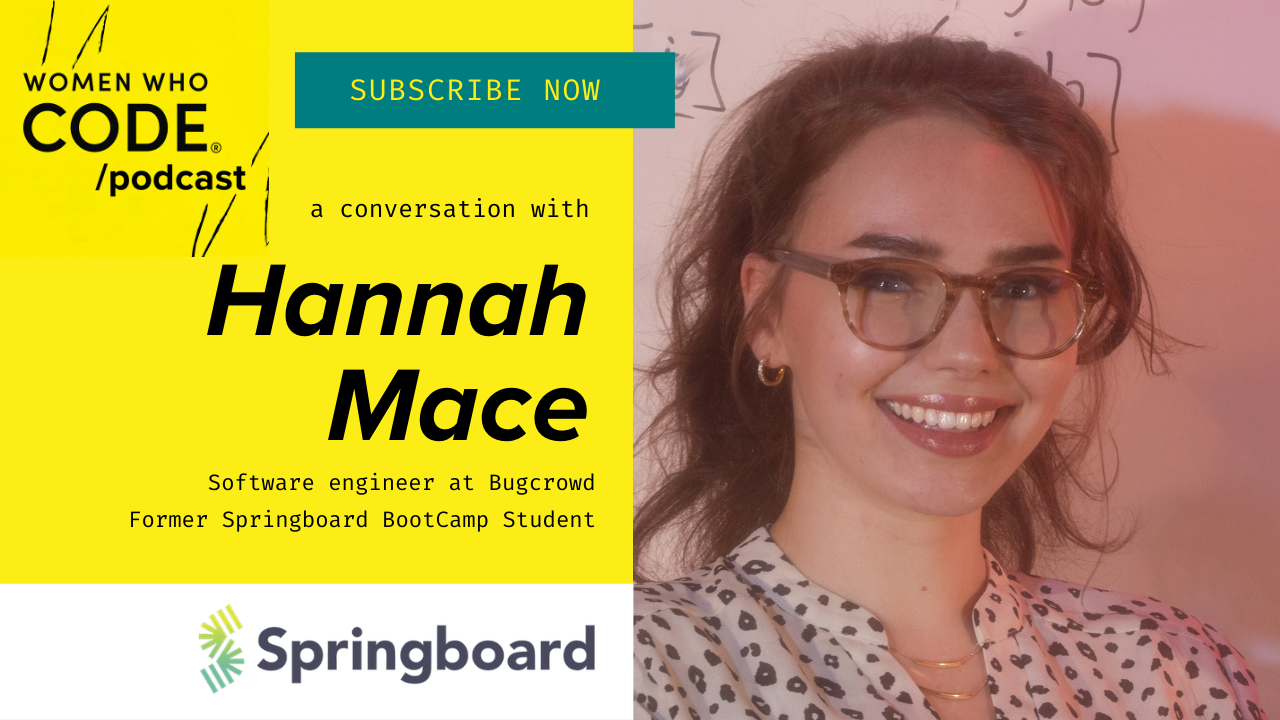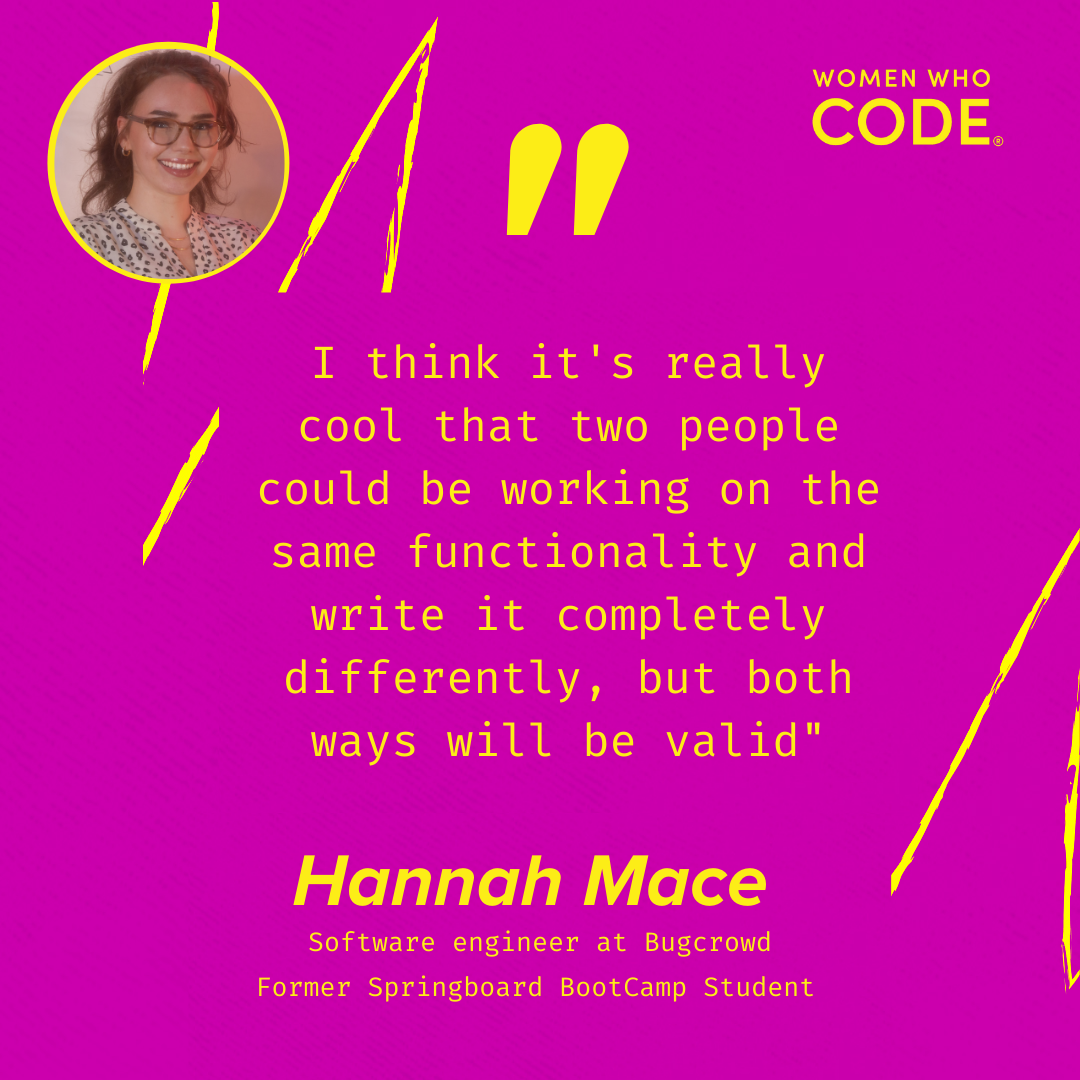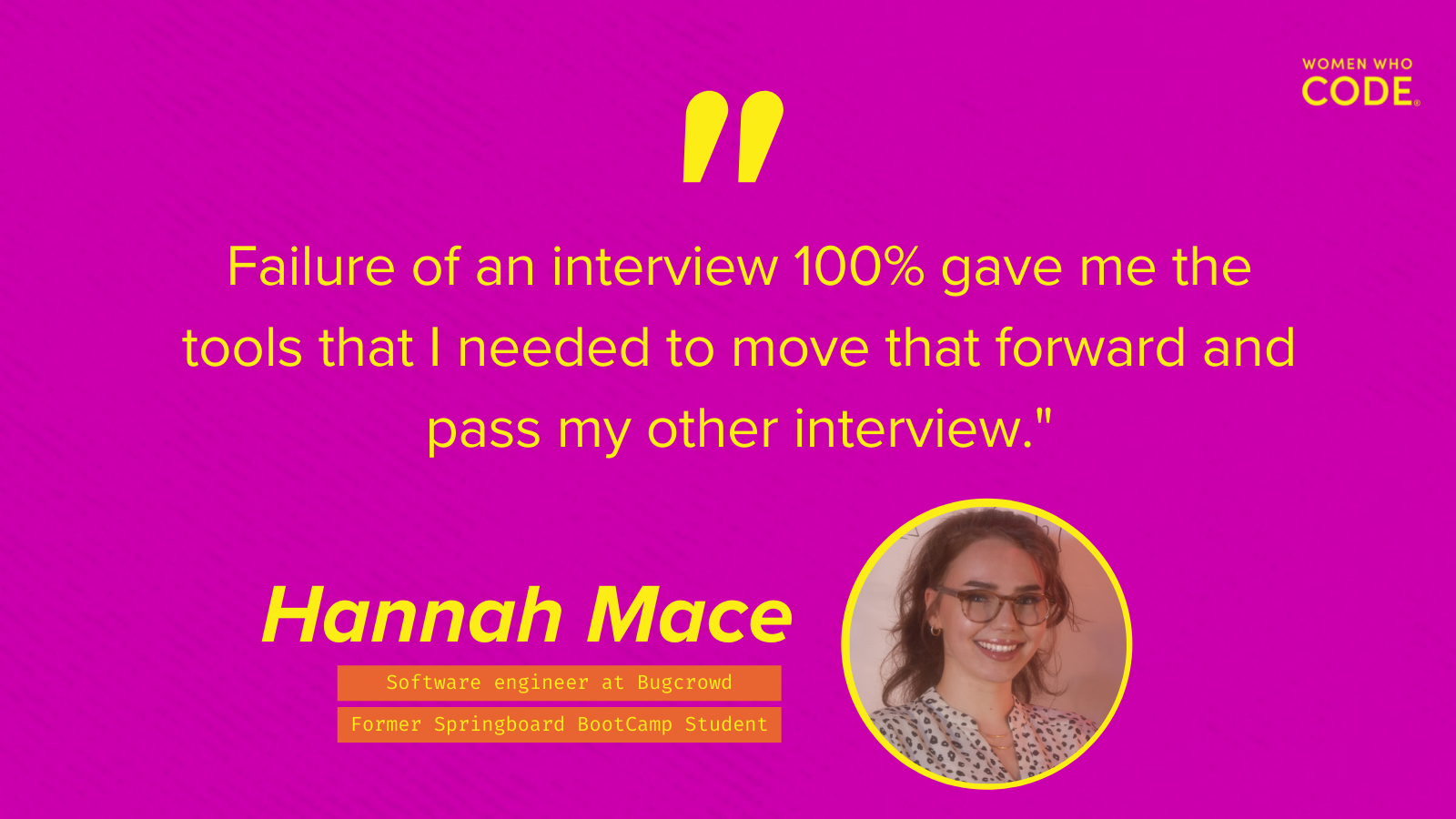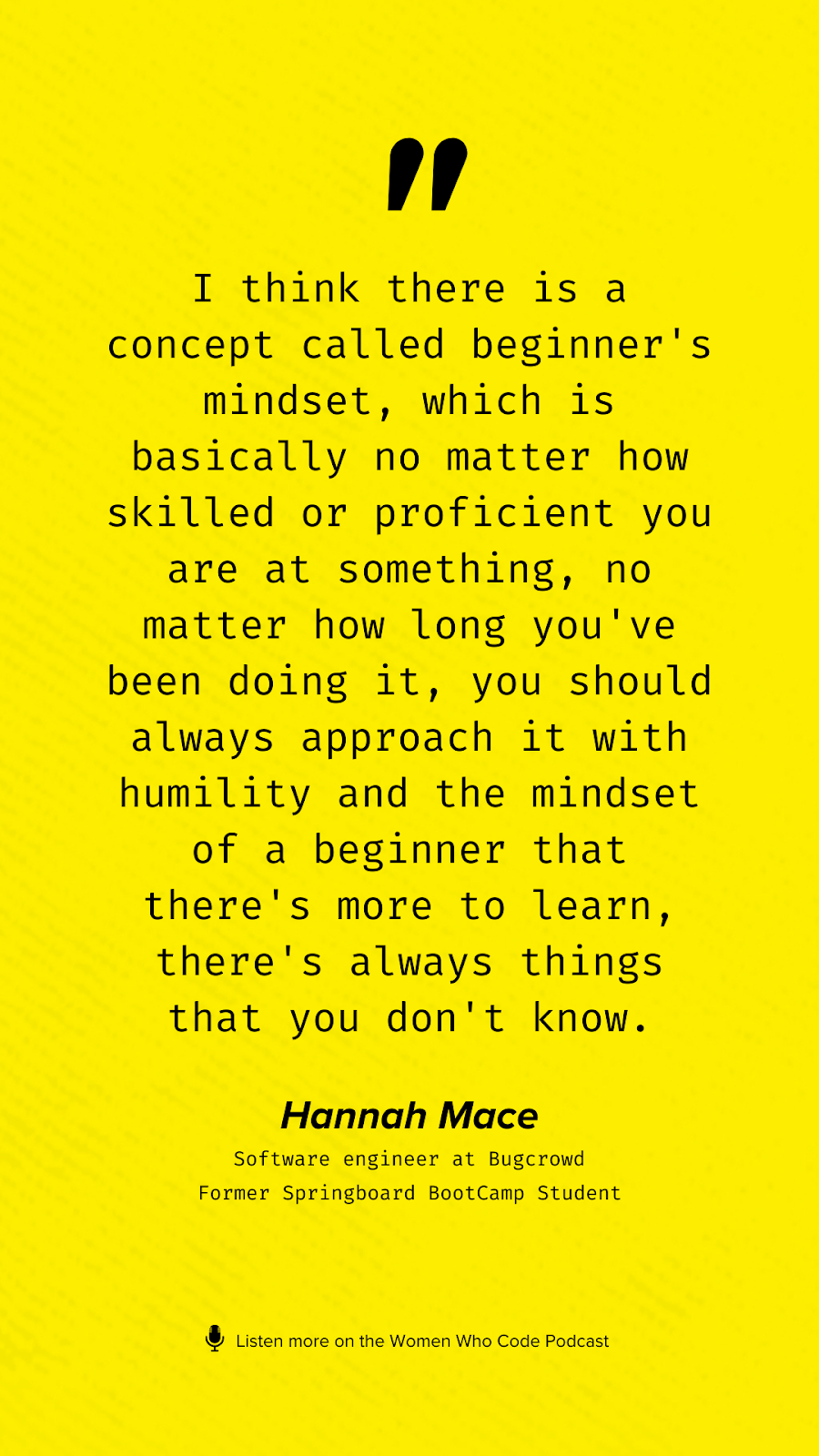WWCode Podcast #25 – Hannah Mace, Software Engineer, Bugcrowd
Written by WWC Team

Can you tell us a bit about what led you to move into tech?
I come from a unique family, filled with engineers. My mom was a systems programmer for the Army. My grandfather was a mechanical engineer. My aunt is a chemical engineer. I grew up with really, really smart people, and I was so lucky that they didn’t force me into any kind of path like that. I was allowed to pursue my dreams of art. I went to film school. I worked in Neon. I worked in laser cutting and a lot of different stuff. As I got older, I realized it wasn’t mentally stimulating. I wanted to learn more. I wanted to be in more intellectual spaces.
Since I lived in San Francisco, I interacted with people that were software engineers all the time. It demystified what a software engineer was to me. I realized it was a really attainable goal. I started tinkering around with some simple JavaScript. When everything shut down and I lost my job, I took that as my opportunity to do a full shift, learn more, learn how to build, and learn the proper techniques and new technologies.
Having that less traditional path, tell us about the process of getting your first job. What was it like interviewing? What were the expectations of somebody coming out of boot camps in terms of experience?
The hardest part of the interview process is getting an interview. After my first boot camp, I had about a year of experience with my personal experience and my three-month boot camp. I noticed I wasn’t getting any kind of feedback on my resume. I wasn’t getting any informational interviews or phone call screens. That pushed me to do my second boot camp.
My first interview was my worst interview. I did horribly. As soon as I closed the zoom, I burst into tears. I went to the on-site for that company and they passed me to the next round of interviews. I spent a whole week studying and preparing based on the feedback that they had given me from my first technical interviews. I went into that on-site really confident. I felt really, really good about how those interviews went. I did not get an offer. It gave me so much motivation and so many specific things to work on. I was able to improve vastly and use it in my next interviews.
When I interviewed for the company that I work for now, my interview was in Ruby. I had never used Ruby. I didn’t know the language. What I did know was data structures, I knew how an object works. I was able to accurately communicate my thought process and my knowledge of data structures. That got me into this job. I wasn’t afraid to take on something that I didn’t know. I just leveraged all the information that I did know to help me get there. I asked for help when I needed it.

In the process of interviewing, were you able to leverage your boot camp experiences at all, during the interviews or projects that you had worked on?
For my company, after I had finished all the rounds of interviews, I felt confident and positive that they were going to extend an offer to me based on my interactions with them. I felt like the director of engineering and I got along well. During my last interview with him, I asked, “Is there anything about my background that would make you hesitant to bring me on?” And he said, “No, actually, I really like that you did two boot camps, because that showed that you weren’t done with your education, that you wanted to continue and learn more.” So, that really affirmed my decision.
Your second boot camp with Springboard was a little bit different and longer than your first. Can you tell us a little bit more about that?
The first one was what you would think of for a typical boot camp, on Zoom, 9 to 5 Monday through Friday for three months. The educational aspect of it was definitely lacking. When I found Springboard, the curriculum was really in-depth. They’re not afraid to teach you the nitty-gritty about things. It is a more self-paced program, it’s about nine months. I think the fastest you can complete it is six months if you’re doing nothing but that. It’s a little bit difficult if you’re not the best at keeping yourself accountable.
I held myself back by not having the right work ethic and keeping things in a sustainable manner. Springboard itself, what they give you is amazing. They have a lot of student resources, advisors, and office hours. Even though you’re not working directly with other people, you’re not alone. The main selling point for me, and what really was the best part of the whole thing, was that they give you a mentor. They are industry professionals who are there to give you actual criticism and feedback on your work.
I ended up getting my job offer before I was done with Springboard because I had that confidence from an industry professional who I knew and I trusted. I don’t think that I would have gotten as far without having that person. I had always wanted someone more skilled on my side, and that’s what Springboard provided. It was amazing.
Do you have the same mentor during the entire process?
Yeah, you do, unless maybe your mentor leaves the program or something unexpected happens to them. I met with the same guy once a week for nine months. He saw me grow and he gave me a lot of encouragement to try other things. That’s where I felt like I was able to grow the most as a software engineer.
Was your mentor helpful in resume prep too?
They have a specific set of recruiters who have worked in recruiting and HR. Those are the people that I went to for specific resume help. I asked my mentor for some feedback on my resume because he does employ junior engineers. There are also people that are skilled in the English language and know how to fine-tune and get those metrics that people look for on your resume. Springboard absolutely provides you with a ton of experts in that area.

Since your time in boot camp, you’ve kind of transitioned into cyber security, can you tell us a little more about that?
It was very intimidating at first. My team is so welcoming. The company itself is the right size startup, you’re not swimming alone. It’s a really nice balance of getting resources and help from everyone that you work with, but you can also push yourself and learn. They will invest in your education as well. I work with the director of cyber security. We’re working on how to think like a hacker. He’s teaching me how to hack so that I can create web applications that have those vulnerabilities in mind.
Let’s talk about your leadership style and how you leverage that in your current role?
I’ve always been a confident person. I’ve always known that if no one else is going to lead, I can take charge. I have no problem being the person at the head, but if someone knows more than me, if someone is more qualified, I would love for them to take charge. I think my leadership style comes from knowing what I know and what I do not know. You have to utilize your own confidence and tools that you have in front of you. I take initiative, without taking on more than I can chew. You don’t want to over-promise and under-perform.
Do you think that your artistic background helps you in the tech world?
It definitely does. I like to work on the back end. A lot of people assume that I like front-end because I have that artistic background, but I find front-end work to be a little limiting. I think that there’s so much art, creativity, and beauty in how you’re building the application. You can totally find ways to think of what you’re doing as writing poetry or writing a story. Your story is the code. You’re just using a different language to write it.
Do you have any passion projects or hobbies you’d like to share?
I used to do a lot of photography. I really loved playing with light and spaces, but that takes up a lot of space. Right now I’m trying to live a little bit more minimally. I’m getting into watercolors. I like that you are at the mercy of the pigment. You can’t control what it’s going to look like, you just have to hope that it comes out well. I love looking at the way the colors interact with each other and how they dry.
You recently gave a talk for Women Who Code titled, Ask Me Anything, How to Apply For The Job Anyway. Without giving the whole talk away, can you give us a little teaser on the content?
Essentially, men apply for jobs that they’re 60% qualified for. Women don’t apply for jobs unless they meet 100% of the qualifications. Realistically, you should be applying for jobs that you meet about 70% of the qualifications. A job listing is a wish list for the company and almost no one is going to hit 100% of the qualifications. It’s about getting out of your comfort zone and applying anyway, there’s no reason not to.
If you could share one pro tip with everyone, what would that be?
There is a concept called beginner’s mindset, which is basically that no matter how skilled or proficient you are at something, no matter how long you’ve been doing it, you should always approach it with humility. The mindset of a beginner is that there’s more to learn, there are always things that you don’t know. In tech especially, what is hot today, what is working for everyone today is not necessarily going to be guaranteed for tomorrow. It’s easy to become redundant or not stay current.
